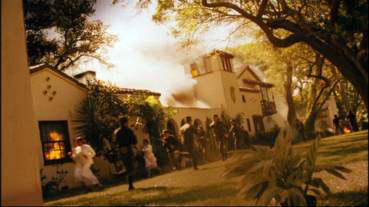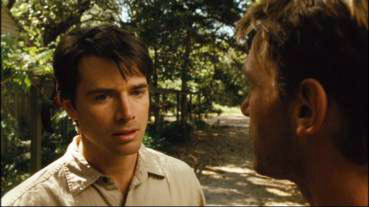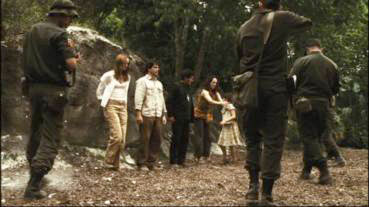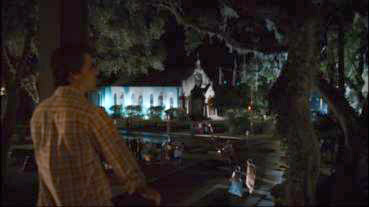| |
"The
most important idea is that it's not as easy to open up
to spiritual experience as we would like. Learning how
not to control others and how not to control our lives
so intensely are two of those breakthroughs. We have to
let go." |
| |
James
Redfield, author The Celestine Prophecy (1993) |
1st
Insight: Doubting Destiny...
There
is a gap in the faith market, one into which I'd have fallen
if I was a little younger, a little more gullible. The gap
is that yawning chasm between conventional religious belief
and downright cold, scientific detachment. Are we blessed
creatures with a paternal creator watching over us or are
we decaying organic matter destined only to fertilize grass
or are we somewhere mystically in between? I stand on the
fertilizer option (or rather will eventually be laying as
fertilizer option) but what about humankind's spiritual
dimension, aspects of our humanity that are not corporeal,
not physical? Let's leave the more famous faith clubs like
Scientology and Kabbalah out of the frame for the time being.
Extraterrestrial seeding and ancient Holy books are not
relevant for debate here. Are we higher beings, more spiritually
advanced than woodlice or do we have no claim on any spiritual
identity and therefore must accept that there is no meaning
of life, just meanings in life and in those relationships
we nurture around us. Hey! How profound is that? Do you
think I could start a cult? I could call it 'The Meaning
In Life' or MILF but I think the acronym is already taken.
Don't Google it if you want to keep your browser's cache
porn-free.

Who
knows about that gap in the market? Wily, new age peddlers
like James Redfield for one. He sold 100,000 copies of his
Celestine Prophecy as a vanity publishing
project before it was officially released by Warners going
on to sell 20 million copies. That's a big gap filled with
a lot of books. And the book's content (or the snippets
offered by the movie) highlights just how much longing and
need there is in us as a species to really believe that
we are special. We're not. We really are not. Live with
it. We're a virus with shoes (thank you, Bill Hicks). The
odd thing is that Redfield has written a touchy feely adventure
novel and his readers are deconstructing the mysticism and
treating it as the real deal. It's like that demented fan
at a J.K. Rowling signing who whispered into Jo's ear "I'm
trying the spells..." and meaning every insane syllable.
American
pop culture is completely obsessed right now with destinies
and purpose and meaning and the fact that we have to be
– we must be – more than ugly, fat skin-bags of mostly water
(speaking for myself of course). Look at the current hit
on TV, Heroes (or X-Men-lite). Not an episode
goes by without someone bleating on about their destiny.
We need more Fight Clubs and fewer faith
clubs. There is nothing wrong with advancing the agenda
of peace and harmony. In fact, there is a positive need
for engineering positive social glue given the parlous state
of the world right now. But new age piffle isn't going to
really provide the foundation on which something with meaning,
something essentially with balls, can build. The nine sacred
'insights' that form the crux of The Celestine Prophecy's
narrative are frankly ludicrous. Like a transparent mammoth,
they are so indistinct and woolly that anything can be read
into them. Redfield has done an extraordinary job of writing
the most anodyne pap so brimming with hooks to snag at the
less discerning reader. Here's the first 'insight' as an
example...
"We
are discovering again that we live in a deeply mysterious
world, full of sudden coincidences and synchronistic encounters
that seem destined."
That's
not an insight. It's preposterous piffle. It's akin to announcing
that we live in a world where every time I open the fridge
I am seeking something cold. I still think Doris Day sung
it better with "Whatever will be, will be..."
As the other 'insights' lead from the previous 'insights',
it seems only fair to look at the first one. To the above
I can only say that it's absolutely perfect to reel in all
those folks who share that shallow worldview. I think coincidences
are sometimes too fantastic to be coincidences but that's
why they are called coincidences. I cannot embark on a spiritual
journey when the first rule of Fight Club is... no, wait...
when the first rule of Redfield's faith club is 'coincidences
are your destiny' because that's just meaningless codswallop.
The other eight have that same hazy, horoscopic meandering
that endears itself to poor, hopeful souls with the critical
faculties of a puffed up pillow. Yeah, yeah... I realise
that I have just insulted a great many people who bought
and ate this book up (they swallowed it) but I have to stand
firm on this. This planet is too wondrous to be cheapened
by hokey, out of focus ideas and passed their sell-by date
irrelevant religions. You want awe? Go and read some popular
science books. Go and get the real thing.
Do you want or need any more proof that Redfield's nine
'insights' are commercially driven? There are eight spin
off books by Redfield available on Amazon that should tell
you more about the value of the original nine – sequels
exist and sequels of anything only exist to make money.
It's like Lucas banging on about how Star Wars
was nine movies right from the start. Yeah, right George.
Again, I must stress how happier I'd be if I opened the
newspaper and read that something positive, a force for
good had made something affirming happen because of raising
consciousness with leaden swill like:

"In
this awareness, we can release our own pattern of controlling,
and discover a specific truth, a mission, we are here
to share that helps evolve humanity toward this new level
of reality.
That's
courtesy of the 6th 'insight'. But it just ain't so. The
funny thing is that these 'insights' aren't actual prophecies
either (neither are they grammatical). No matter. 35 million
readers (estimated readership) can't be wrong. Can they?
2nd Insight: Movie Mysticism
So
to the movie which promises us this third way of connecting
with the world in between blind religious faith and scientific
disbelief. Coming a good fourteen years after the book,
one asks "Why now?" According to Redfield, it's
a control issue (I thought he was into giving control up?)
and as producer and writer, he must take some responsibility
for the ensuing movie's quality. Poor man. Like Perfume,
the film-makers are taking on a big subject here: personal
enlightenment. How does that interior epiphany get the exterior
visual treatment? They just turn up the colour grading to
11. Oh. Conventional faith and conventional non-faith give
way to The Celestine Prophecy, or 'est'
in a wetter climate. To my shame (I usually try so hard)
I have not read this apparently life-changing book that
draws upon the ideas that Eric Berne pondered over in his
seminal 'Games People Play', something the author has freely
admitted.
The
core narrative is an adventure story in which a disgruntled
teacher is fired from his job and after a brief chat with
an ex, he jets off to Peru to research the nine insights
of the Celestine Prophecy, ancient scrolls that seem to
be relevant to our 21st century life, as you do. He stumbles
from one idiotic coincidence to another while being shot
at and chased by those who want to make sure the great wisdom
of some monk a long time ago doesn't get out.
Where
to start? How about nine, short film-making insights?
1.
Thou shalt write sub-texturally
The
first thing that struck me (about once every twenty seconds
or so – very hard) is how extraordinarily on the nose
and free from sub-text the dialogue was. This screenplay
was written by someone who does not know who Robert McKee
is. Every line is a clunker that drags the movie down with
each earnest pronouncement. People, real people simply do
not communicate like this. Everything was up front and plain
to the point of absurdity. Characters said what was on their
minds – bang. No mystery, no suspense, no development.
2.
Seventeen Deus Ex Machinas are never good
The
coincidences that enabled our hero to literally blunder
into people who could help him (with motorcycles, for Christ's
sake) or situations that simply happened because the plot
needed them to happen were excruciatingly contrived. These
events and their random nonsensical qualities made a mockery
of narrative.

3.
Cloying strings at every turn are trying way too hard
Music,
as we have remarked on this site many times, is a very powerful
tool. Like a heat seeking missile, it can hone in and magnify
any filmed emotion – or it can blow the whole movie
up because of crucial misjudgement. See Patch Adams.
The music in this movie is commanding you to find it life
affirming. Anything that tries this hard usually has the
opposite effect. I wanted to scream. In more lucid moments
I wanted to scream at the composer, Nuno Malo.
4.
Special Effects usually need to be special
Energy
– in the movie – is some sort of Lucasian field
around an individual. We all have it and it pushes people
away and flows into people helping them. As a special effect
it blows goats. It makes the actors look like they're on
a Christmas biscuit tin cover and while swathing the actors
in a mysterious ectoplasmic glow, it holes the movie below
the water line. Let's not mention the colour grading of
the past in the hero's dreams (After Effects on Impressionistic
Filter 6.5). Just plain silly.
5.
The Hero takes a journey (but thou shalt like the bastard
at the very least).
Matthew
Settle plays John, the teacher hero of the movie. From his
resumé on the IMDB it's clear the guy gets employed.
So why is his performance in Prophecy so
listless, lifeless, empty and shallow? Yes, there are those
actors who do the stillness thing but we know what's going
on behind their eyes. Matthew Settle is a dark, pretty boy
with (in this movie at least) the acting chops of a varnished
log.
6.
Jürgen Prochnow doesn't need money this badly
Prochnow
is a man with built in gravitas, a face that's weathered
a few storms and a dignity even maintained if he has to
deliver his role in heavily accented English. As the bad
guy Jensen in Prophecy, he's so one dimensional,
he's flat-packed. Whenever he came on screen, I asked the
TV "Why Jürgen, why?"
7.
Men who deal in high explosives are not usually morons
There
is a scene in which many bombs are all clustered together.
Jürgen is harassing our hero, tries to stab his kneecaps
(I know, I know) and ends up with the hero flipping a simple
switch to start a ten second countdown on a lump of C3 near
many other lumps of C3. "You idiot!" he shouts.
"You've killed us all!" I think Jürgen was
the idiot.

8.
Never commit Heaven to film
Such
a tricky one, this one. Constantine tried it (clouds and light – didn't work). According
to Celestine, heaven is a place on Earth
where you are invisible and all the colours have been saturated
to within a gnat's hair of Hendrik's Mandala status. God,
please make it stop.
9.
I never thought I'd make it to 9 so...
...will
just say that this movie is simply and unutterably awful.
And there's a typo in the end credits (BBC Motion Gallary?
Oh dear).
3rd Insight: A Nod To Nirvana
There
is a problem with enthusiastic, deep seated and life-affirming
ninety-nine percent atheism (I'm not hedging just acknowledging
that a belief in something improvable is just as irrational
as an absolute denial of same). It is that atheism's criminally
misunderstood by both those of faith and even by those without.
Atheism is a word of denial and denial is perceived as negative
and as Jonathan Miller said in his documentary series on
disbelief, why was it necessary to have a word to cover
a non-belief at all? It was like needing a word to describe
one's disbelief in fairies or magic or that 'ij' is a letter
in the Dutch alphabet. Have a guess which one of those is
true. What the negativity of the word also does is close
down the atheists' options in the spiritual realm from others'
perspectives – which I think is erroneous. Atheists
do not put ceilings on their life experience – just the
translation and re-channelling of that life experience into
something involving an omniscient creator who cares for
us individually while creating a never-ending hell for those
of us who transgress a set of frankly ridiculous rules.
I am in (some may say 'religious') awe when I look at the
night sky. My eyes sparkled with delight at the discovery
of an Earth type planet three days ago. OK, it's five billion
light years away so my son won't be visiting it soon but
the universe is a constant catalyst provoking awed reverence.
Let's
not forget the earthbound awe. If you wrapped your head
around natural selection and came to understand its complex
simplicity (which I have the faintest grasp of, a leaf of
the rainforest so to paraphrase) you would faint with the
utter breathtaking tremendousness of it. I came into natural
history by mistake but it was a glorious mistake (ooh! Proof
of the power of the prophecy!) and I do understand that
the holes in people's lives must be filled and faith lurks
as a sort of poisonous Polyfilla, a catch all belief system
which has the most sublime business plan. It promises you
eternal life in return for your belief. Do you think faith
ever had a dissatisfied customer? No cadaver has had cause
to complain. But what of spiritual matters? Unencumbered
by the cliché of divine interpretation, I'm all for
those moments in life where we feel insufferably content,
filled with an enlightenment so fleeting it's almost a crime
against our natures that it leaves us. Love is its distant
cousin because these experiences I'm talking about cannot
be talked about. You either feel them or you don't.

I
have friends who hang on to the idea that our presence on
this vast spinning rock has a meaning outside of the 'living,
breathing now'. The force of coincidence and synchronicity
is brought to the table. I am just blown away on a daily
basis at the statistical improbability of my being alive
and being able to witness the blink of time that this planet
would call my lifespan. I'm afraid I enjoy but place no
significance in coincidence.
It's
your call. Are we random or are we meaningful? Oh, please...
An
anamorphic 1.78:1 presentation, the movie looks good until
the special effects kick in but I've already had a go at
those. There are three choices on sound and the 5.1 out
of all three (Dolby 2.0, Dolby 5.1 and DTS) is workmanlike
– nothing hugely remarkable, no great literal bass
shakes. I cannot judge the DTS (I have two surround amps
which play DTS but I cannot bring myself to watch any more
of this film than I absolutely have to).
The
Making Of The Celestine Prophecy (25:21)
The same old fluff (everyone loved each other etc.) but
with much more added sanctimonious, new age bullshit from
James Redfield. The man is convinced that we will all go
and see this movie (militant, fundamental and radical Muslim
or Christian) and will all point at the screen and go "Ah,
I see!" and we will all live happily ever after. If
only the movie had been released before 9/11... I'm sorry
but it's one thing to have lofty goals and another to have
new age silliness that pretends to be profound the way that
Bush pretends to have rhythm.
Trailer
A marketing tool as much for the 'insights' as for the movie.
Straightforward trailer, no big deal. Strike that. I've
seen it three times now and it gets worse. It's so mock-profound
that it just gets funnier. "Have you ever experienced
a coincidence that you cannot explain?" etc. It sounds
like it's voiced by the Indian guy in Heroes
(the one whose father was charting the emergence of the
mutants). It's a good voice but one suspects he's front
and centre because people equate Indian with mysticism.
God, movies like this can really make one cynical.
Taking
coincidence, intuition and hunches and repacking them as
a new religion does not a great movie make. My brain shuts
down when I hear characters saying things like "You
have to let go..." and "You must open up...".
It's a cliché festival wrapped in faux gravitas.
In doing some research (yes, we actually do a bit of that)
I found out from Box Office Mojo that this movie's widest
release was 19 theatres in the US. This explains its box
office tally of significantly less than a million dollars.
God knows how much it cost to make but someone out there
had no faith in this picture, which is a blisteringly exquisite
irony to end on.
|